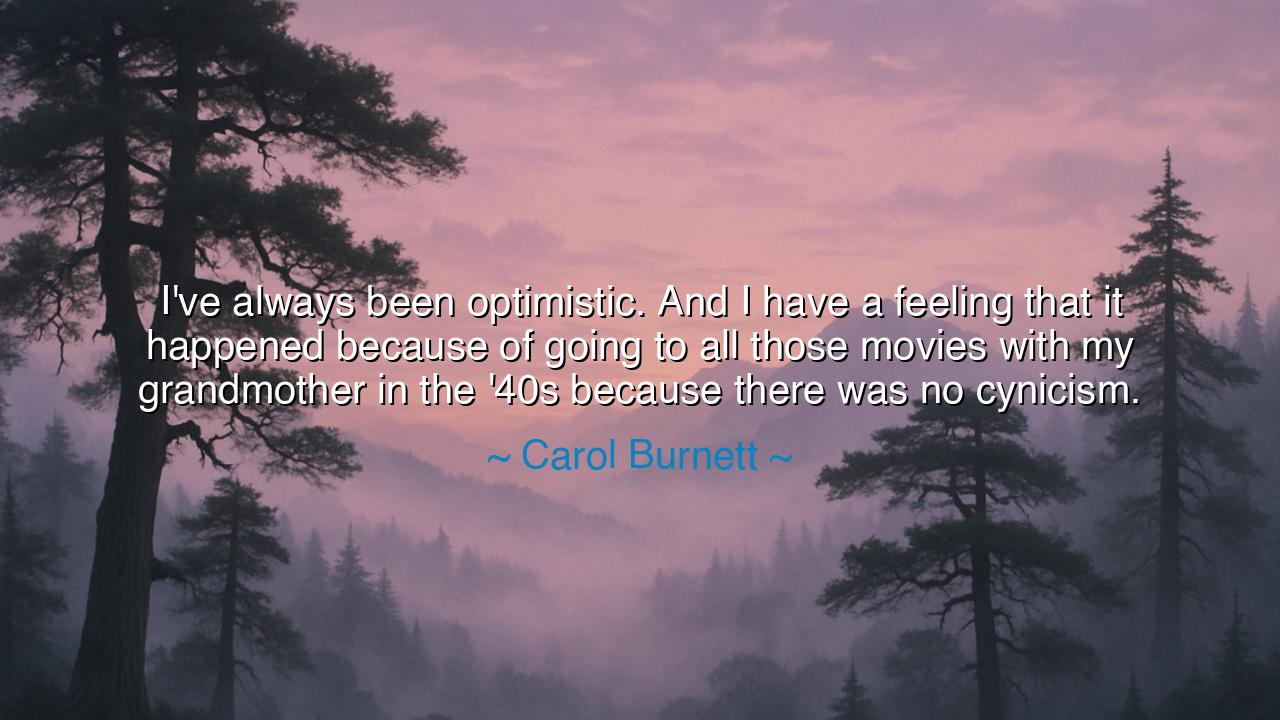
I've always been optimistic. And I have a feeling that it
I've always been optimistic. And I have a feeling that it happened because of going to all those movies with my grandmother in the '40s because there was no cynicism.






Hear now, O Seekers of Truth, the words of Carol Burnett, whose heart shines with the wisdom of the ages: "I've always been optimistic. And I have a feeling that it happened because of going to all those movies with my grandmother in the '40s because there was no cynicism." In these words, Burnett reflects on the origins of her optimism, tracing it back to the days of her youth, when she sat beside her grandmother in the movie theaters of the 1940s—a time when hope, idealism, and innocence filled the screen. These films, she suggests, shaped the way she saw the world, planting in her heart a seed of positivity that would grow throughout her life.
In the age of the ancients, the storyteller was revered as a guide, a keeper of wisdom who could impart both caution and hope. Consider the Greek tragedians, who, though their plays often dealt with suffering and the struggles of the human soul, also conveyed the possibility of redemption, the eternal hope that no matter how dark the world became, there would always be the potential for light. Burnett’s words recall this ancient sense of storytelling, where the narrative was not merely about the harsh realities of life, but about the potential for goodness, for triumph, and for the overcoming of adversity. In the movies of the 1940s, there was a similar lack of cynicism—a hopefulness that permeated the screen, filling viewers like Burnett with a belief that the world, despite its flaws, could be beautiful, that love and justice would ultimately triumph.
In those days, the movies were more than just entertainment; they were a reflection of the ideals of the time—a world still recovering from the ravages of war, yet eager to rebuild, to dream, and to hope. Films were filled with heroes who overcame great challenges, love stories that defied the odds, and plots where good ultimately triumphed over evil. It was an age when optimism was not seen as naive, but as necessary—a vision of what could be, rather than a reflection of what was. It was into this world that Burnett was born, a world where the films she watched with her grandmother shaped her deeply, planting within her the belief that life could be joyful, that the human spirit could overcome anything. This was a time when cinema offered a sanctuary from the hardships of the world, a place where hope was alive in every frame.
Consider the example of the ancient Romans, who, though often embroiled in wars and political intrigue, also created works of literature and art that celebrated the virtues of courage, honor, and love. Even in times of great turmoil, these ideals provided strength, not just for the soldiers who fought on the frontlines, but for the citizens who lived with the knowledge that, though challenges were many, virtue could still prevail. Similarly, Burnett’s love of those movies, full of innocence and joy, represents a time when hope was not seen as unrealistic, but as the very foundation upon which society could rebuild itself. It is through this lens of optimism that Burnett shaped her worldview—a worldview that would influence her work and her life, leading her to become not only a beloved comedian and actress but a beacon of light for others.
But let us not forget, O Seekers, that in every age, the winds of cynicism blow strong, attempting to drown out the flames of hope and idealism. There are always those who, in the face of adversity, choose to look only at the dark side of things, who believe that the world is beyond redemption, and who see the worst in humanity. Yet it is in optimism, in the belief that good can triumph, that greatness is born. Just as Burnett was shaped by the films of the 1940s, so too can we allow the stories we encounter—whether they are in the form of books, films, or personal experiences—to shape us, to fill us with the courage to face the challenges of our own lives.
So, O Seekers, take this lesson to heart: in a world that often seems filled with doubt and disillusionment, choose to be an optimist. Choose to believe in the goodness of people, in the possibility of change, in the triumph of light over darkness. Just as Burnett was shaped by the movies she watched with her grandmother, so too can the stories we surround ourselves with shape us. Do not let the cynicism of the world steal your hope; instead, hold fast to the belief that the human spirit is capable of great things. Let your optimism be a beacon, guiding you through the stormy seas of life, and in turn, become a light for others to follow.
And finally, remember this: optimism is not born from ignorance, but from the strength to believe in the possibility of goodness, even when the world seems to say otherwise. Just as the ancient storytellers used their tales to inspire hope and perseverance, so too can you use the stories that shape your heart to light your way. Like Carol Burnett, choose to see the world not for what it is, but for what it could be, and know that in doing so, you will walk in the footsteps of the great optimists who have come before you.






AAdministratorAdministrator
Welcome, honored guests. Please leave a comment, we will respond soon